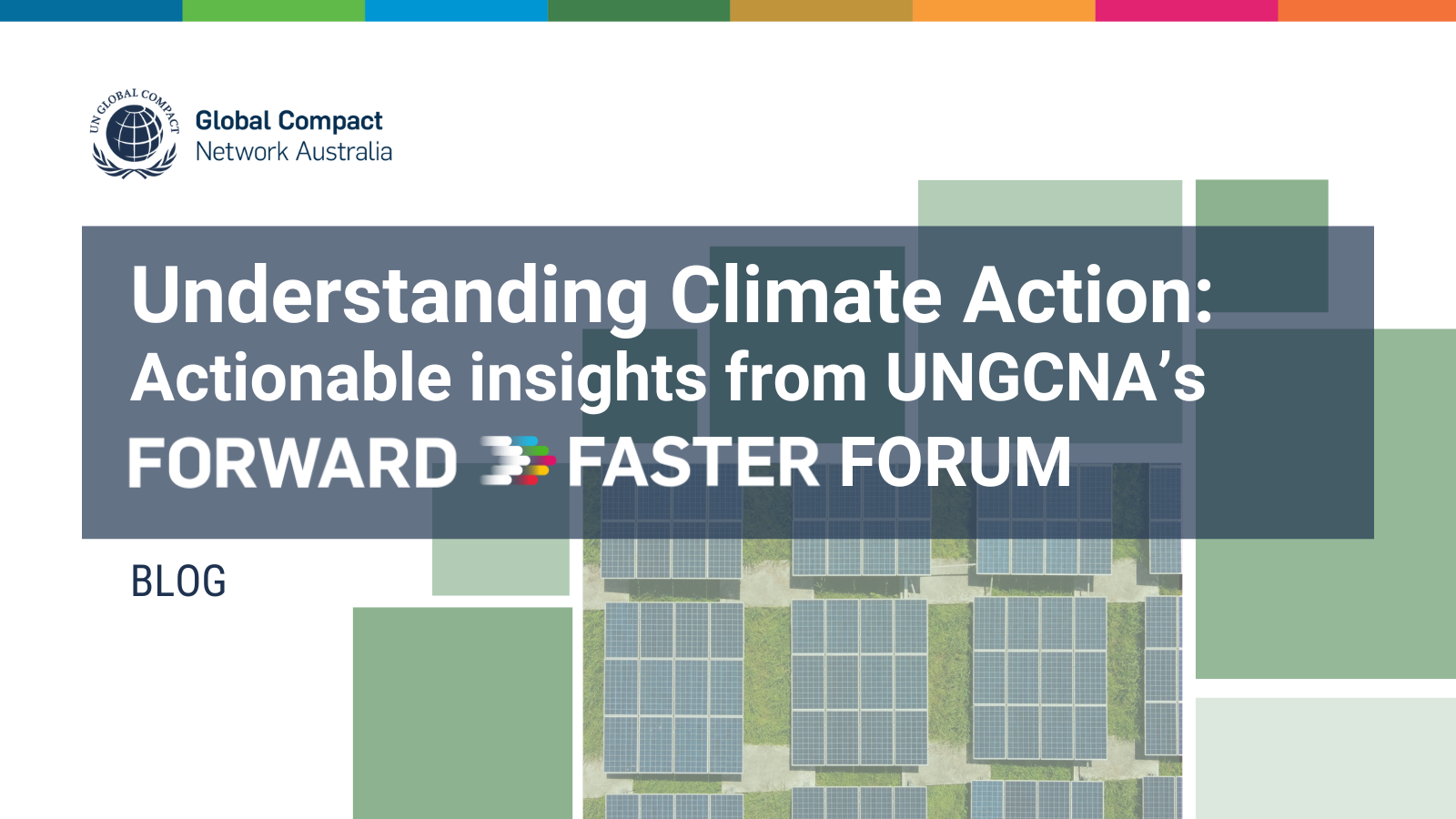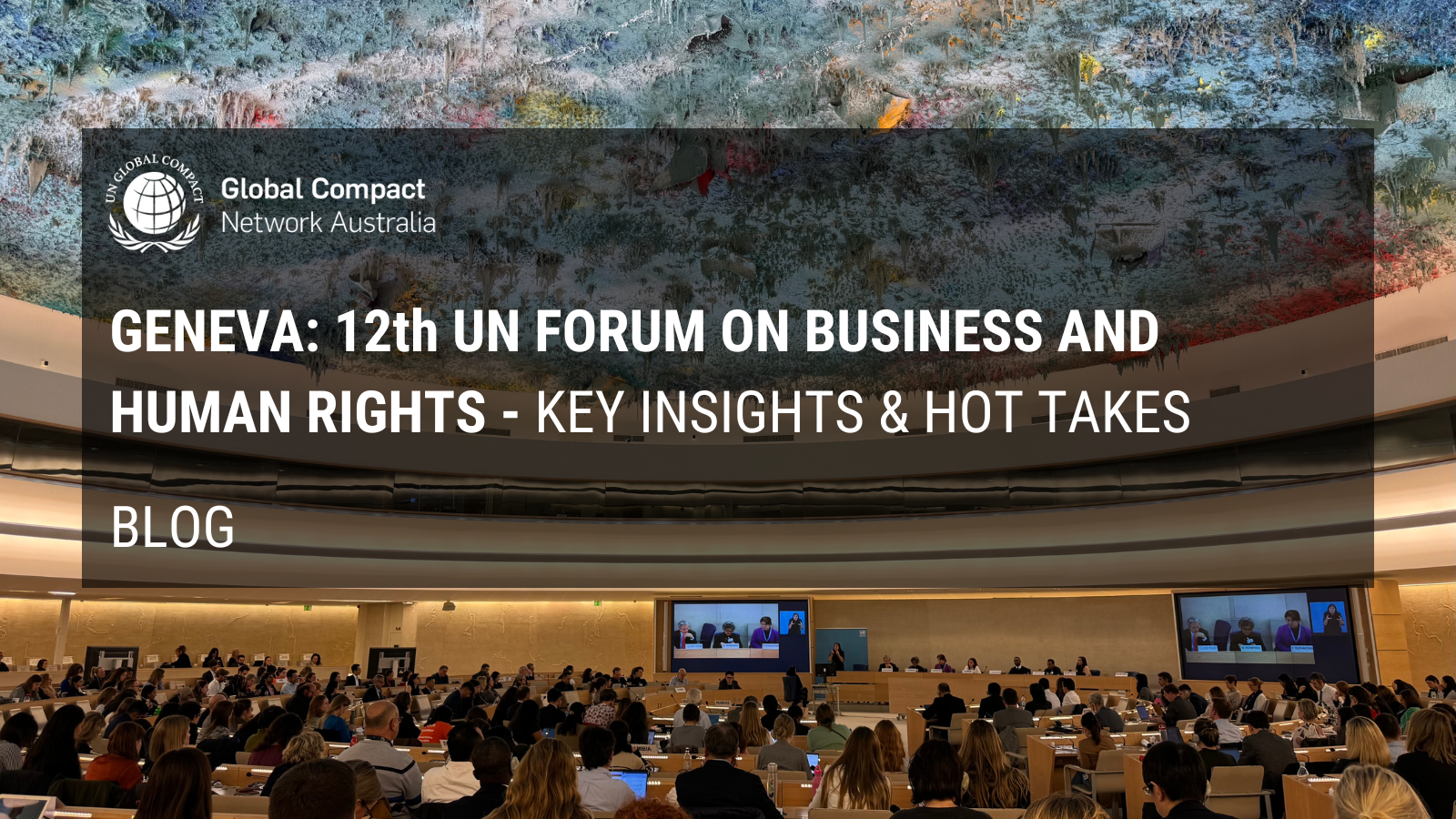
Blogs, Environment & Climate Change
BLOG | Understanding Climate Action: Actionable insights from UNGCNA’s Forward Faster Forum
Dr Evan Center | April 29, 2024
As global emissions reach alarming levels and climate change poses growing challenges to businesses worldwide, the United Nations (UN) Global Compact is calling on companies to play their part in closing the ambition gap and focus efforts on deep decarbonisation, reaching net zero by 2050 at the latest.
The UN Global Compact Network Australia’s (UNGCNA) recent Forward Faster Forum, held before the National Banksia Sustainability Awards in Melbourne, brought together business leaders and change-makers to tackle climate action – one of the five action areas of the UN Global Compact’s Forward Faster initiative.
How will taking ambitious action in this area benefit your company?
Taking climate action will help future-proof your business and pave the way for a more sustainable future. Here are some of the benefits of setting targets for climate action:
- Improve efficiency and cut operating costs by reducing energy usage and emissions.
- Strengthen your reputation with customers, suppliers, investors and regulators whilst reducing your exposure to climate risks.
- Stay one step ahead of policy changes and climate regulations.
- Ensure you leave no one behind in the transition to an environmentally sustainable economy.
The UN Global Compact’s Forward Faster initiative
The UN Global Compact’s Forward Faster initiative was launched on 18 September 2023 and focuses on five areas of action where companies can make the biggest, fastest impact across the 17 Sustainable Development Goals by 2030. The five areas of action are:
- Gender equality
- Climate action
- Living wage
- Finance and investment
- Water resilience.
As part of the UNGCNA’s Forward Faster Forum, the panel discussion on Climate Action explored the mechanisms necessary for supporting companies’ net-zero transition plans, including adopting science-based targets and measures addressing the social impacts of climate change mitigation and adaptation efforts.
The Forward Faster initiative’s Climate Action targets are:
Target 1 – Set corporate science-based net-zero emissions reduction targets in line with a 1.5°C pathway, with the goal of halving global emissions by 2030 and reaching net zero by 2050 at the latest.
Target 2 – Contribute to a just transition by taking concrete actions that address social impacts of climate change mitigation and adaptation measures in partnership with actors such as workers, unions, communities and suppliers.
UNGCNA’s Forward Faster Forum – Climate Action panel:
- Evan Center, Senior Manager, Environment and Climate Change, UN Global Compact Australia (facilitator)
- Cate Harris, Group Head of Sustainability at Lendlease Foundation
- Marcus Dawe, Chief Executive Officer, MCI Carbon
- Madelaine Waters: Social Impact Manager at Princess Polly
Key takeaways
Here are three key takeaways from the session.
1. Carbon Innovation: Shaping climate solutions from emissions
Achieving meaningful climate action requires innovative approaches to carbon management, transparency in reporting, and ambitious, measurable targets.
The panellists’ insights underscored the importance of technological innovation, mandatory reporting, and a shift towards absolute zero emissions across all sectors for tackling the climate crisis. Marcus Dawe, CEO of MCI Carbon, emphasised the transformative potential of their technology for combatting climate change, which in their case involves mineral carbonisation. “Our innovative approach transforms CO2 emissions into valuable building materials and manufacturing components,” Dawe explained. However, he stressed the importance of integrity in proving the efficacy of their technology, underscoring the need for both technical and economic viability.
Madelaine Waters, Social Impact Manager at Princess Polly, highlighted the importance of transparency and accountability in driving climate action. She emphasised the value of mandatory reporting and full transparency in the fashion industry, advocating for around 6 to 11 disclosure activities each year. Madeleine highlighted the challenge of balancing reporting burdens with real progress, encouraging a phased approach focused on impactful strategies.
Cate Harris, Group Head of Sustainability & Lendlease Foundation at Lendlease, advocated for ambitious climate targets, challenging the notion of net zero as business as usual. “The larger goal is a 2040 target: achieving absolute zero emissions across all scopes—1, 2, and 3,” Harris emphasised.
2. Tackling Scope 3 Emissions: Collaborative Strategies for Decarbonisation
Scope 3 emissions represent the biggest share of our carbon footprint, often exceeding 90% of total emissions for many organisations. Understanding the magnitude of these emissions underscores the imperative for concerted action across supply chains.
Initiatives like Lendlease’s collaboration with suppliers signal a clear commitment to decarbonisation, urging suppliers to reduce their carbon intensity in line with corporate targets. Lendlease’s publication of their Scope 3 Emissions Protocol reflects a broader industry effort to establish clear reporting standards and boundaries, fostering transparency and accountability.
Marcus Dawe stressed the importance of addressing Scope 3 emissions, emphasising industry collaboration and government support to drive widespread adoption. He stated, “Business as usual is our greatest climate enemy; there are two groups, one that is driving climate action and the other that is driving climate destruction – if you’re doing business as usual, then you are the latter.”
Madelaine Waters emphasised the significance of supply chain engagement in Scope 3 emissions reduction efforts. “People are at the heart of what we do, and scope 3 is about bringing them along the journey,” Waters asserted.
3. Pioneering Just Transitions: Fostering People-Centric Change
Just transition initiatives, as defined by the International Labour Organization (ILO), green the economy in a way that is as fair and inclusive as possible to everyone concerned, create decent work opportunities, and aim to make sure no one is left behind.
This aligns with the second climate action target, emphasizing concrete actions to address the social impacts of climate change mitigation and adaptation measures in collaboration with key stakeholders such as workers, unions, communities, and suppliers.
Panellists highlighted the need for comprehensive frameworks and government support to drive meaningful change. Marcus Dawe emphasised, “The just transition is about people. People are going to solve climate change.”
Join the companies taking action
To join the companies taking action or to find out more about the UN Global Compact’s Forward Faster initiative go to: forwardfaster.unglobalcompact.org
Contributors: Sunder Erdenekhuyag, Environment and Climate Change Intern, UN Global Compact Network Australia.



